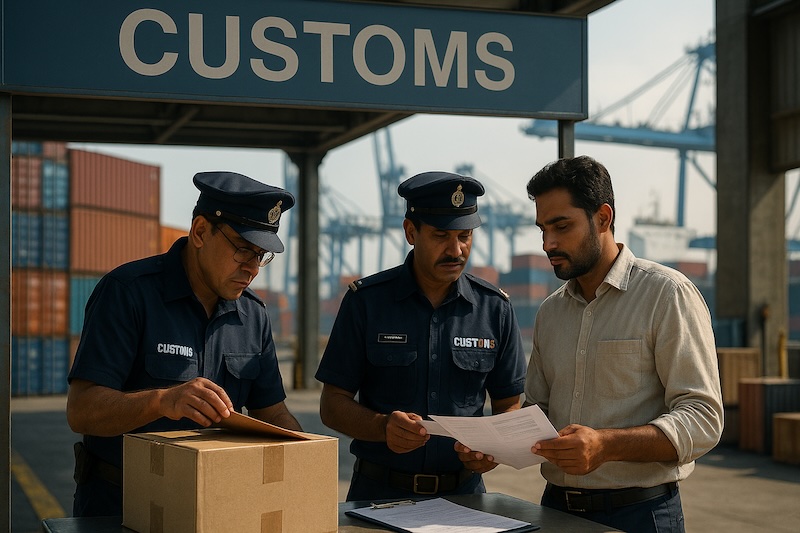India’s Customs: Efficiency Gains Amid Persistent Corruption Concerns

TL; DR: Despite reforms that reduced average cargo release time, recurring bribery allegations expose persistent corruption in Customs. Yet there’s no readily available public data on corruption cases or actions taken involving customs officials, thereby hindering transparency, accountability on institutional performance.
Context:
The recent allegations of bribery and corruption against Chennai Customs officials by Tamil Nadu-based Wintrack Inc. have once again brought the spotlight to the functioning of India’s Customs Department and its impact on the ease of doing business. Following the claims made by the company, the Department of Revenue (DoR) under the Union Finance Ministry has ordered a fair, transparent, and fact-based inquiry into the matter.
However, this is not an isolated incident. Allegations of corruption within the Customs Department have surfaced repeatedly over the years. In 2019, the government compulsorily retired 15 senior Customs and Central Excise officials, including one of the rank of Principal Additional Director General (ADG), on charges of corruption. More recently, in August 2025, the CBI arrested a Superintendent of Customs at Sahar Air Cargo, Mumbai, for accepting a bribe. Notably, a similar case involving another Superintendent at the same location had occurred just a year earlier in July 2024. These repeated incidents underscore how deeply entrenched corruption remains within the Customs machinery.
Unfortunately, there is no comprehensive public data on the number of Customs officials booked or prosecuted for such offences. In this story, we take a closer look at the available statistics related to Customs operations in India.
Who compiles this data?
The article relies on multiple statistics from different data sources. Data on the customs revenue is sourced from Union Budget documents, while the statistics on inspections carried out by Directorate General of Performance Management (DGPM) are sourced from the DGPM portal, and on trade facilitation from National Time Release Studies (NTRS).
Where can I download clean & structured data related to Customs operations?
Clean, structured, and ready-to-use datasets on Customs operations are available for download on Dataful. It provides insights on the revenue from customs in gross tax revenue and performance measurement to quantitatively assess cargo release times.
Key Insights:
- Customs receipts account for 6.5% of gross tax revenue: Gross tax revenue of the Government of India (GoI) is derived from multiple sources, such as income tax, GST, customs, excise, corporation tax, wealth tax, and other receipts. Between 2008-09 and 2016-17, customs revenue contributed around 15% of the gross tax receipts. However, following the rollout of GST, which subsumed key import duties like Countervailing Duty (CVD) and Special Additional Duty (SAD) (except on petroleum and alcohol), the share of customs in total tax revenue declined sharply. Since 2017-18, customs receipts have averaged about 6.5%, peaking at 7.4% in 2021-22 before declining to 6.7% in 2023-24.
- 153 inspections were carried out by DGPM: The Directorate General of Performance Management (Customs, GST & Service Tax) (DGPM) is responsible for studying the working of the Customs, Central Excise and Central GST departmental machinery throughout the country. Between 2015-16 and 2021-22, a total of 153 inspections were carried out across all regional units and headquarters, with Western Regional Unit (WRU) (Jurisdiction- Maharashtra, Gujarat, Goa and Daman & Diu) topping the list with 32 inspections. However, the findings of these inspections are not in the public domain.
- India’s National Time Release Study (NTRS) evaluates cargo release efficiency across 15 major customs formations categorised as Seaports, Inland Container Depots (ICDs), Integrated Check Posts (ICPs), and Air Cargo Complexes (ACCs), revealing mixed performance trends between 2021 and 2025. At Chennai, the seaport demonstrated substantial improvement with Average Release Time (ART) declining from 102:46 hours (2021) to 86:39 hours (2023) which further rose to 88:42 hours (2025), while the ACC showed consistent reduction from 52:25 hours (2021) to 43:28 hours (2023) and 39:04 hours (2025), representing a cumulative reduction of over 13 hours. Across India, seaports generally improved by ~6 hours, ACCs by ~5 hours, and ICPs by ~18 hours between 2023 and 2025, while ICDs witnessed an increase in ART by around 12 hours as compared to 2023.
Why does it matter?
Repeated bribery allegations against Customs officials, including in Chennai, highlight the gap between reform and reality. While customs receipts remain a key part of India’s tax base and studies like the NTRS show improvements in cargo clearance times, corruption and procedural delays continue to erode progress.
Further, the absence of comprehensive data on corruption cases, investigations, and departmental actions makes it difficult to assess how effectively the system addresses wrongdoing. This lack of transparency within the Customs department erodes the integrity of the institution and hampers the ease of doing business.
Key numbers:
- Customs revenue as % of Gross Tax Revenue (GTR):
2017-18: 6.7%; 2020-21: 6.6%; 2023-24: 6.7%
- Inspections carried out by DGPM:
2015-16: 30; 2018-19: 19; 2021-22: 19
- Average Cargo Release Time:
Seaports: 85:42 Hrs (2023) → 79:04 Hrs (2025)
ICDs: 71:46 Hrs (2023) → 83:41 Hrs (2025)
ACCs: 44:16 Hrs (2023) → 39:20 Hrs (2025)
ICPs: 31:47 Hrs (2023) → 13:30 Hrs (2025)